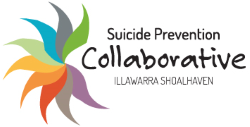Friends and family members play a vital role in helping people suffering suicidal distress. But it is important to ensure they also get support in what can be an isolating experience.
Story by Natalie Croxon, Photo by Sylvia Liber, Illawarra Mercury.
Mental health service Stride is funded by the NSW government to provide support to family and carers of people with mental health conditions in the Illawarra and Shoalhaven.
Jade Bonham works as a carer peer worker for Stride, herself having been a carer for members of her family experiencing mental health concerns.
She has been a carer for her "whole life, essentially", saying "mental health is very far reaching in my family".
"I can draw on that experience, that lived experience, in differing capacities for different carers, and give them messages and themes of hope, that there's always going to be some tough times but not to lose hope when you're in the thick of things, and that there are people around who can help support you," Ms Bonham said.
This week marks National Carers Week, a time to recognise the people who devote time and energy to caring for a loved one.
Jo Riley, suicide prevention program manager at the south eastern NSW primary health network COORDINARE, said family members, friends and other supports played a crucial role in helping those experiencing thoughts of suicide.
Often they did not think of themselves as a carer, Ms Riley said, but it was important to acknowledge them and ensure they received support, too.
"It can be a really isolating experience," Ms Bonham said of being a carer.
"When you're in the thick of things, often those close to you who are not experiencing it might not really understand the emotional impact that it can have on a person who is supporting a loved one.
"There can be often at times immense distress."
Stride family and carer service lead Danielle Carson said being a carer could also affect a person's job and subsequently finances, and their relationships, including those with other family members.
Stride helps carers take care of themselves, providing one-on-one support, advocacy, education, and self-care events.
"We do support groups like walk-and-talks, coffee groups, art groups - lots of different things," Ms Carson said.
When it comes to suicide prevent, Ms Bonham said Stride helped reduce stigma and offered a safe space for people to connect with others with similar experiences.
Ms Carson said the service strengthened carers who supported people experiencing suicidal distress, and offered help to carers who were bereaved by suicide.
How carers can become more confident helping people in distress
Ms Riley said there were simple, safe steps carers could take to help someone who was struggling, including QPR training.
QPR - question, persuade, refer - teaches people how to identify the signs of suicidal distress, ask someone if they are experiencing suicidal thoughts, and refer them to appropriate support.
Ms Riley said family members or supporting people were often best placed to notice when someone wasn't "their usual self".
"We encourage families and chosen supports to have open and direct conversations with their loved ones about support and safety, particularly when they're in crisis. Planning ahead for these times is really worthwhile," Ms Riley said.
"This isn't about trying to control everything or take decisions away from people who are struggling. It's about doing what you can to keep them safe while they're in crisis."
Both Ms Bonham and Ms Carson have themselves undertaken QPR training.
Ms Bonham said it "just boosts your confidence" and "it makes you feel like you can answer the questions and ask the questions and refer on".
"I think it just gives them that peace of mind that they can talk about something that they're scared of talking about," Ms Carson said.
"People just need to know that they're doing the right thing."
QPR training takes about one hour and is delivered online.
The Mercury and the Illawarra Shoalhaven Suicide Prevention Collaborative have partnered to deliver 500 free courses to the community.
- Support is available. Call Lifeline on 13 11 14 or the Suicide Call Back Service on 1300 659 467. For those who have lost a loved one by suicide, StandBy Support After Suicide (phone 1300 727 247) and Thirrili Indigenous Postvention Support (24/7, phone 1800 805 801). Carers of people living with suicidal thoughts can contact Stride's Wollongong office on 4229 7254 or familyandcarer@stride.com.au for support.
